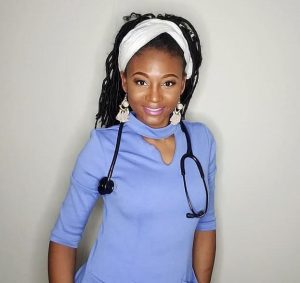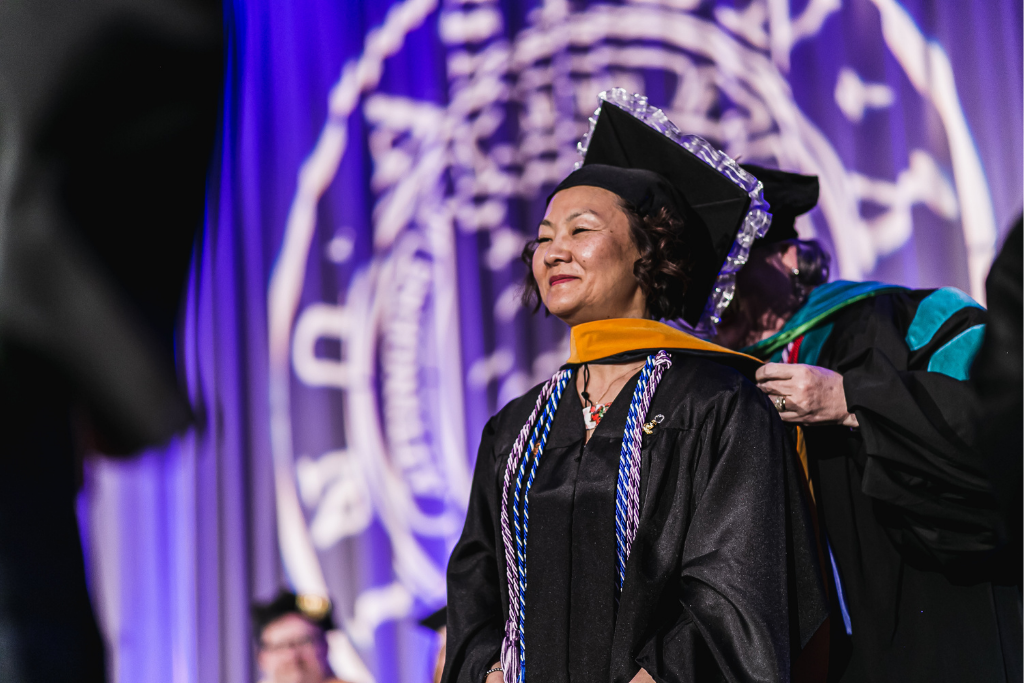Do you like to study and track health trends? Do disease processes interest you? Are you interested in public health on an even larger scale than traditional nursing? If so, public health nursing — and an MSN in Public Health — could be the path for you.
Public health nurses (PHN) focus on entire populations, communities, or groups of people. They educate the public on health issues and diseases, improve community health, and increase the public’s access to care.
We address the topic, “What Can You Do With An MSN in Public Health?” in several ways:
- What is a public health nurse?
- What do public health nurses do?
- Education, training, and certification
- Salary and job outlook
We also speak with a public health nurse about her role and how she uses her MSN in Public Health education.
What is a public health nurse?
Public health nurses focus on the community’s long-term health and safety. While many nurses may have a specialty (education, administration, etc.) or specific focus (prenatal, med-surg, etc.), public health nurses focus on whole communities. They play a vital role in the prevention of diseases. Additionally, public health nurses promote:
- Prevention
- Education
- Assessment
- Evaluation
Public health nurses meet diverse populations’ health needs, specifically underserved, underprivileged, and disproportionate populations.
What do public health nurses do?
Public health nurses are registered nurses who work in various settings:
- Community clinics
- Health departments
- Home health agencies
- Schools
- Outpatient clinics
- Hospitals
- Government agencies
Public health nurses promote and advocate for the public’s health and safety. In addition to educating the public, they also collaborate with other healthcare professionals. Their duties include:
- Evaluating and monitoring health trends and risk factors unique to specific communities
- Conducting community assessment, program planning, and policy development
- Working with community resources to refer patients to the proper agencies
- Educating and providing direct healthcare services to vulnerable populations
- Improving access to healthcare services by informing people about locally available healthcare programs and services
- Promoting and preserving the health of families, aggregates, communities, and populations
- Developing, planning, and implementing primary prevention, illness prevention, and health promotion
The work hours depend on the needs of the population the nurse is serving. Public health crises, such as a pandemic, may require more work hours. Learn more about the differences between the public health nurse vs. community health nurse.
Education, training, and certification
Most organizations require a public health nurse to be a registered nurse with a bachelor’s degree with at least a year’s experience in public health.
Nurses who earn a Master’s of Science in Nursing (MSN) with a specialization in Public Health can join the workforce as:
- Public health nurse managers
- Directors of community health programs
- Directors of health departments
- Educators
- Infection preventionists
Public health nurses with a graduate degree may also choose to pursue a specialization, such as epidemiology and biostatistics.
To earn an MSN in Public Health, a nurse must first obtain a BSN in nursing from an accredited nursing program. MSN in Public Health programs equip graduates with:
- Knowledge and skills to solve public health and community health problems
- Foundations of public health theory, health care policy, and politics
- Insight and awareness to define, assess, and drive change
- A heightened understanding of public policies, theories, principles, and their application to real-life cases
Nurses interested in obtaining certification can seek to become Certified in Public Health, but there is currently no specific certification for public health nursing.
To be eligible, individuals must meet the specific criteria:
Earned a Master’s or doctorate from a school or program of public health accredited by the Council on Education for Public Health (CEPH)
or
Earned a bachelor’s degree, in any concentration, and at least five subsequent years’ public health work experience
or
Relevant graduate-level degree and at least three subsequent years’ public health work experience
or
A certificate from a school or program of public health that is accredited by or in applicant status with CEPH, and at least three subsequent years’ public health work experience
Salary and job outlook
According to Indeed.com, the average annual salary for public health nurses is $69,149. Indeed lists the top 5 highest paying cities for public health nurses as:
- Washington D.C.
- Atlanta, GA
- San Francisco, CA
- Baltimore, MD
- Brooklyn, NY
The job outlook for all nurses is increasing. In medically underserved areas, the need for public health nurses will increase. With the emergence of COVID-19, the spotlight on public health nursing shines even brighter.
Aspen spoke with Deana L. Wilhoite MS, RN, — nurse of 20 years—about her role as a public health nurse.
PW: What made you pursue an MSN in Public Health?
DW: I’ve worked in pediatrics since I graduated from nursing school. I first started in acute care in the inpatient setting. Nurses were not “exposed” or knowledgeable about the costs of patient care. As bedside nurses, we never thought about the costs of medications, supplies, etc. We did not think about costs or even recognized who was truly paying. When I moved to the ambulatory setting and worked in a smaller outpatient infusion therapy clinic, the nurse manager helped me see that all care we provide has a cost or “price tag.” If the patient does not use expensive medications, then insurance cannot be billed. This cost goes back to the department or unit. Patients or families can also become responsible for this burden. Working in ambulatory helped me see that there were many systems involved in just one aspect of patient care. I wanted to learn more about how policies — organizational, state, and federal—influenced the care that we provided as nurses.
PW: What was your journey to public health?
DW: I soon transitioned to a primary pediatric care clinic to engage in matters associated with public health. I was able to see patients’ transition as they came from acute care to their primary care. This setting provided me collaborative opportunities as I engaged with community providers. I wanted to know more about why healthcare focuses more on acute care instead of placing our focus on where people live and thrive the most —within their communities. I started to look for programs that focused on public health nursing and were not clinical-based, such as APRN but would be more about taking part in, leading, and creating programs that would support wellness in the community setting.
PW: What was your MSN in Public Health program like?
DW: I loved how my graduate nursing program let me set my path based on my interests. I had many interests regarding public health. The course content was foundational. Some of which covered:
- Legal and ethical issues in health care
- Public health theory and research
- Healthcare policy
The assignments and projects encouraged me to create discussions and projects based on my interests and what I saw as needs. Also, I liked that I could create my own experiences and further discover my own community.
PW: How have you used your MSN in Public Health?
DW: I have used my MSN in public health in various ways.
- I have been part of the selection committee for hiring a Chief of Police within my town. I brought a nursing and public health perspective to the role as I focused on questions that supported well-being and good outcomes for the community.
- I have engaged in research and projects that focus on public health and community concept areas such as mental wellness, school nursing, public health risk communication.
- I have been a social justice advocate and have written statements on behalf of organizations to share how racism can negatively impact health outcomes for people of color and our communities.
- I am currently teaching, and I enjoy integrating public health and population health concepts and ideas into my courses.
PW: What type of nurse should pursue public health?
DW: A compassionate person who desires to learn more and recognizes that they have the skills and knowledge to influence and lead change. Also, someone who is a systems thinker. Someone who can recognize and identify that there are so many factors involved, and that change comes when addressing issues on many levels.
PW: What are the career options for nurses with an MSN in public health nursing?
DW: Anywhere a master’s degree is needed, your public health nursing background can support your knowledge and skills for the job. Public health nurses can be:
- Administrators in hospitals or communities
- Program coordinators
- Directors
- School faculty or instructors
PW: What do you like most about a career in public health?
DW: Public health nursing was the “original” nursing specialty area when we go back to Lillian Wald and others who provided care for families within the community. They engaged with the community. Public health nursing allows you to know your communities and populations on a deeper level because you are familiarizing yourself with various aspects of their being. It truly allows you to have a deeper understanding of the people you serve.
PW: What do you like least?
DW: I feel that public health nursing does not get the recognition it deserves outside of the nursing community. Many sectors will recognize MPH (Master’s Public Health) and understand this, but they do not understand that public health nurses have an excellent knowledge base. We have the nursing background to help us with critical thinking, reasoning, and judgment.
PW: Any advice for people who are interested in public health nursing?
DW: I would say explore and be open to discovering many avenues of your passions and interests while you are in school. As a systems thinker, look at your population on various levels to discover further public health issues that you can address.
Nurses interested in learning more about public health nursing can check out the Association of Public Health Nurses or The Council of Public Health Nursing Organizations. If you’re interested in pursuing a public health career, check out our MSN in Public Health program.
 Portia Wofford is an award-winning nurse, writer, and digital marketer. After dedicating her nursing career to creating content and solutions for employers that affected patient outcomes, these days, Portia empowers health practices to grow their communities through engaging content that connects and converts. Follow her on Instagram and Twitter for her latest.
Portia Wofford is an award-winning nurse, writer, and digital marketer. After dedicating her nursing career to creating content and solutions for employers that affected patient outcomes, these days, Portia empowers health practices to grow their communities through engaging content that connects and converts. Follow her on Instagram and Twitter for her latest.

